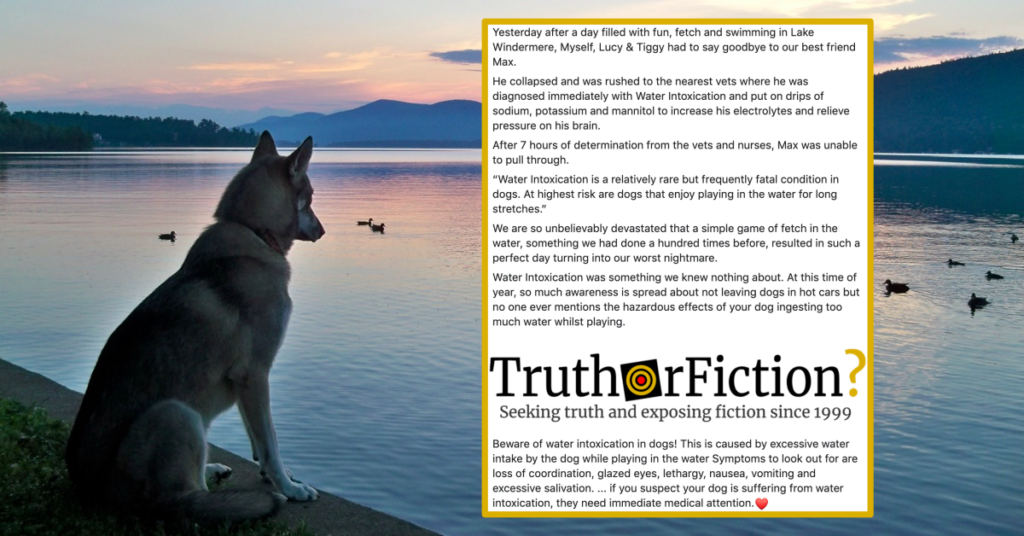A July 2018 Facebook warning about dogs suffering from water intoxication continued circulating in 2019, describing the unexpected death of an otherwise healthy pet:
This appeared to be a copy of an individual’s Facebook post to a page with a broader audience, in an account explaining that a day at the lake resulted in a dog named Max’s sudden death due to an electrolyte imbalance caused by drinking too much water. An original version of the story posted in June 2018 accrued more than 100,000 shares:
[Max] collapsed and was rushed to the nearest vets where he was diagnosed immediately with Water Intoxication and put on drips of sodium, potassium and mannitol to increase his electrolytes and relieve pressure on his brain.
After 7 hours of determination from the vets and nurses, Max was unable to pull through.
[…]
We are so unbelievably devastated that a simple game of fetch in the water, something we had done a hundred times before, resulted in such a perfect day turning into our worst nightmare.
Nothing in the post provided insight into what particular behaviors or activities might have led to the dog becoming ill from water intoxication, and the overall outing described (a family trip to a lake) was not out of the ordinary for dog owners. In that format, the post drew attention to the possible risks of water intoxication, but didn’t shed light on how dog owners could protect their pets from falling ill in the same fashion.
In August 2017, a California dog became sick and died under similar circumstances. A two-year-old schnauzer was taken to the vet by his owners after exhibiting symptoms of water intoxication following a visit to a lake, and the dog died 45 minutes after he began exhibiting symptoms.
According to the American Society for the Prevention of Cruelty to Animals (ASPCA), water intoxication can occur in dogs — just as it can in humans. The summer months present a larger risk, but the condition is rare. Canine water intoxication can be confirmed by veterinary lab tests when it is suspected:
Acute water intoxication is not common, and it generally happens during the warmer months when a pet has been at the beach or a pool. Make sure you know what to look for and the best next steps to take if a patient presents with this tricky problem.
The ASPCA Animal Poison Control Center explains that initially—and in milder cases—clinical signs may include nausea, vomiting, lethargy and abdominal distention. In more severe cases ataxia, weakness, coma, seizures, hypothermia and bradycardia may occur.
Hyponatremia will be noted on laboratory tests; however hypochloremia, hypokalemia and hyposthenuria are also seen.
Water intoxication in dogs can be treated if identified in time. The ASPCA provides the following guidance to veterinarians:
The primary goal with treating acute water intoxication is to raise the plasma sodium concentration; typically this is done no faster than 0.5-1 mEq/L per hour, however if patients are showing severe symptoms in an acute situation, this rate may be faster.
For more mildly affected patients this may mean a mild water restriction with serial electrolyte monitoring and close observation for any neurological signs. In more symptomatic cases fluids containing a sodium concentration that is higher than what the patient shows are generally recommended.
In critically affected cases hypertonic saline, furosemide or mannitol may be considered.
Unfortunately, not all dogs respond to treatment when afflicted:
Water intoxication progresses quickly so if your pet has been playing in the water and begins to show any of the signs mentioned above, it’s crucial to seek veterinary care immediately to save your dog’s life.
Treatment of water intoxication typically includes IV delivery of electrolytes, diuretics and drugs to reduce brain swelling. With aggressive veterinary care, some dogs are able to recover, but sadly, many do not.
Lakes and bodies of water are not the sole risk-bearing factors. Dogs can be exposed to risk at home during ordinary outdoor play:
Water games that involve retrieving items or diving into pools to catch toys can cause them to ingest large quantities of water very quickly. It can also happen when they “catch” pressurized water from sprinklers or hoses.
As far as prevention, tips to avoid overhyration are as follows:
You can prevent water intoxication by monitoring your dog’s interaction while swimming or with pressurized water sources such as the sprinkler or garden hose. Give your dog frequent breaks when exercising and offer frequent opportunities to drink fresh clean water.
Although canine water intoxication is real, it occurs rarely despite many dogs’ affinity for playing in water. Pet owners who suspect their dog is exhibiting symptoms of water intoxication are advised seek immediate veterinary care. The Pet Poison Helpline (855-764-7661) or the ASPCA Animal Poison Control Center(888-426-4435) are open 24 hours a day, seven days a week.
- Treating Acute Water Intoxication in Pets
- Water Intoxication in Dogs
- Does Dog Water Intoxication Exist?
- EMERGENCY INSTRUCTIONS
- Animal Poison Control
- Family’s warning after healthy dog dies from swallowing too much water playing in a lake
- Dog Dies of Water Intoxication After Playing Fetch in Lake: 'It's Like He Was Drunk'

